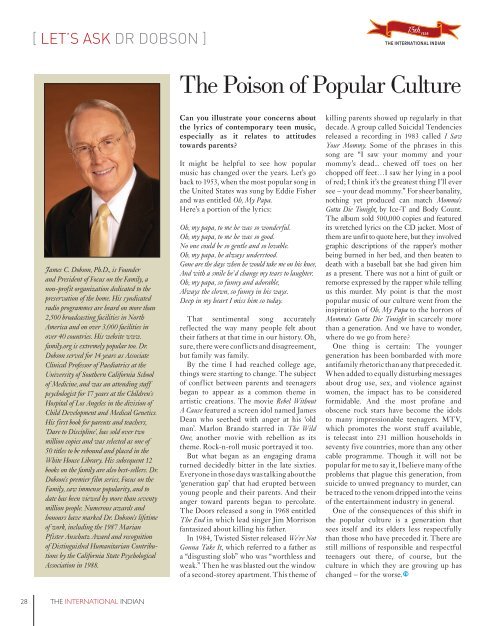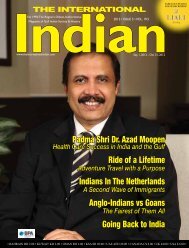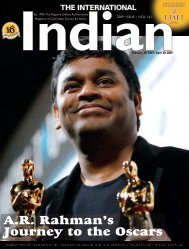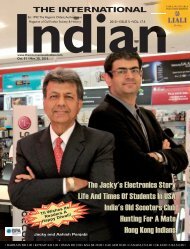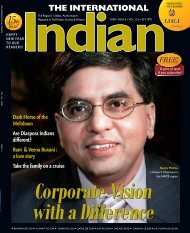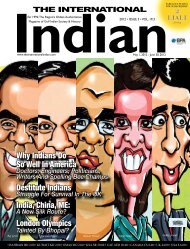THE BUSINESS OF EDUCATION - International Indian
THE BUSINESS OF EDUCATION - International Indian
THE BUSINESS OF EDUCATION - International Indian
You also want an ePaper? Increase the reach of your titles
YUMPU automatically turns print PDFs into web optimized ePapers that Google loves.
[ LET’S ASK DR DOBSON ]<br />
The Poison of Popular Culture<br />
James C. Dobson, Ph.D., is Founder<br />
and President of Focus on the Family, a<br />
non-profit organization dedicated to the<br />
preservation of the home. His syndicated<br />
radio programmes are heard on more than<br />
2,500 broadcasting facilities in North<br />
America and on over 3,000 facilities in<br />
over 40 countries. His website www.<br />
family.org is extremely popular too. Dr.<br />
Dobson served for 14 years as Associate<br />
Clinical Professor of Paediatrics at the<br />
University of Southern California School<br />
of Medicine, and was an attending staff<br />
psychologist for 17 years at the Children’s<br />
Hospital of Los Angeles in the division of<br />
Child Development and Medical Genetics.<br />
His first book for parents and teachers,<br />
‘Dare to Discipline’, has sold over two<br />
million copies and was selected as one of<br />
50 titles to be rebound and placed in the<br />
White House Library. His subsequent 12<br />
books on the family are also best-sellers. Dr.<br />
Dobson’s premier film series, Focus on the<br />
Family, saw immense popularity, and to<br />
date has been viewed by more than seventy<br />
million people. Numerous awards and<br />
honours have marked Dr. Dobson’s lifetime<br />
of work, including the 1987 Marian<br />
Pfister Anschutz Award and recognition<br />
of Distinguished Humanitarian Contributions<br />
by the California State Psychological<br />
Association in 1988.<br />
Can you illustrate your concerns about<br />
the lyrics of contemporary teen music,<br />
especially as it relates to attitudes<br />
towards parents?<br />
It might be helpful to see how popular<br />
music has changed over the years. Let’s go<br />
back to 1953, when the most popular song in<br />
the United States was sung by Eddie Fisher<br />
and was entitled Oh, My Papa.<br />
Here’s a portion of the lyrics:<br />
Oh, my papa, to me he was so wonderful.<br />
Oh, my papa, to me he was so good.<br />
No one could be so gentle and so lovable.<br />
Oh, my papa, he always understood.<br />
Gone are the days when he would take me on his knee,<br />
And with a smile he’d change my tears to laughter.<br />
Oh, my papa, so funny and adorable,<br />
Always the clown, so funny in his ways.<br />
Deep in my heart I miss him so today.<br />
That sentimental song accurately<br />
reflected the way many people felt about<br />
their fathers at that time in our history. Oh,<br />
sure, there were conflicts and disagreement,<br />
but family was family.<br />
By the time I had reached college age,<br />
things were starting to change. The subject<br />
of conflict between parents and teenagers<br />
began to appear as a common theme in<br />
artistic creations. The movie Rebel Without<br />
A Cause featured a screen idol named James<br />
Dean who seethed with anger at his ‘old<br />
man’. Marlon Brando starred in The Wild<br />
One, another movie with rebellion as its<br />
theme. Rock-n-roll music portrayed it too.<br />
But what began as an engaging drama<br />
turned decidedly bitter in the late sixties.<br />
Everyone in those days was talking about the<br />
‘generation gap’ that had erupted between<br />
young people and their parents. And their<br />
anger toward parents began to percolate.<br />
The Doors released a song in 1968 entitled<br />
The End in which lead singer Jim Morrison<br />
fantasized about killing his father.<br />
In 1984, Twisted Sister released We’re Not<br />
Gonna Take It, which referred to a father as<br />
a “disgusting slob” who was “worthless and<br />
weak.” Then he was blasted out the window<br />
of a second-storey apartment. This theme of<br />
killing parents showed up regularly in that<br />
decade. A group called Suicidal Tendencies<br />
released a recording in 1983 called I Saw<br />
Your Mommy. Some of the phrases in this<br />
song are “I saw your mommy and your<br />
mommy’s dead... chewed off toes on her<br />
chopped off feet…I saw her lying in a pool<br />
of red; I think it’s the greatest thing I’ll ever<br />
see – your dead mommy.” For sheer banality,<br />
nothing yet produced can match Momma’s<br />
Gotta Die Tonight, by Ice-T and Body Count.<br />
The album sold 500,000 copies and featured<br />
its wretched lyrics on the CD jacket. Most of<br />
them are unfit to quote here, but they involved<br />
graphic descriptions of the rapper’s mother<br />
being burned in her bed, and then beaten to<br />
death with a baseball bat she had given him<br />
as a present. There was not a hint of guilt or<br />
remorse expressed by the rapper while telling<br />
us this murder. My point is that the most<br />
popular music of our culture went from the<br />
inspiration of Oh, My Papa to the horrors of<br />
Momma’s Gotta Die Tonight in scarcely more<br />
than a generation. And we have to wonder,<br />
where do we go from here?<br />
One thing is certain: The younger<br />
generation has been bombarded with more<br />
antifamily rhetoric than any that preceded it.<br />
When added to equally disturbing messages<br />
about drug use, sex, and violence against<br />
women, the impact has to be considered<br />
formidable. And the most profane and<br />
obscene rock stars have become the idols<br />
to many impressionable teenagers. MTV,<br />
which promotes the worst stuff available,<br />
is telecast into 231 million households in<br />
seventy five countries, more than any other<br />
cable programme. Though it will not be<br />
popular for me to say it, I believe many of the<br />
problems that plague this generation, from<br />
suicide to unwed pregnancy to murder, can<br />
be traced to the venom dripped into the veins<br />
of the entertainment industry in general.<br />
One of the consequences of this shift in<br />
the popular culture is a generation that<br />
sees itself and its elders less respectfully<br />
than those who have preceded it. There are<br />
still millions of responsible and respectful<br />
teenagers out there, of course, but the<br />
culture in which they are growing up has<br />
changed – for the worse.<br />
28<br />
<strong>THE</strong> INTERNATIONAL INDIAN


